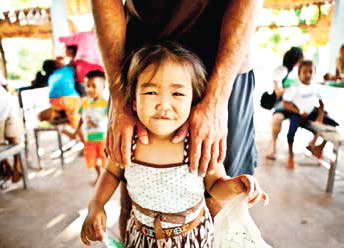Antiretroviral therapy (ART) has transformed pediatric HIV from a disease with a 50 percent mortality rate before the age of two in Sub-Saharan Africa into a chronic illness that can be controlled with medicines. ART works by stopping HIV from destroying CD4 cells, a type of white blood cell that prevents and fights infection. However, while the World Health Organization (WHO) recommends that all HIVpositive children under two years of age start ART, a new study shows that too few are receiving treatment before HIV causes their CD4 levels to fall to dangerous levels.

Photo: Kevin Tachman
The TREAT Asia Pediatric HIV Observational Database (TApHOD) contributed to a global study of CD4 levels of children starting ART in low-, middle-, and high-income countries around the world. The analysis included data from 35,823 children (with a median age of 5.4 years) from 24 countries. It showed that more than 50 percent of children already had severely weakened immune systems, indicated by low CD4 levels, by the time they began ART. In children, severe immunodeficiency is defined by age groups as a CD4 cell proportion of total white blood cells: <25 percent (age <12 months), <20 percent (age 12–35 months), <15 percent (age 36–59 months), and either CD4 <200 cells/ mm3 or <15 percent for children older than five. The median CD4 level in the children younger than five in the study was 13 percent, and 194 cells/mm3 in children five and older.
Most often, it was children younger than one who had the lowest CD4 levels and were consequently most in need of treatment. The prevalence of children who already had severe immunodeficiency when starting ART was 22 percent in high-income countries, but more than double this in low- and middleincome countries at 57–63 percent. Although overall CD4 levels at ART initiation have somewhat improved over time, the majority of children in poorer settings are still starting ART with severely weakened immune systems.
These children need to be tested earlier so that they can receive treatment before their risk for opportunistic infections, impaired growth, and slow brain development increases.
Avila D, Patel K, Chi B, Wools-Kaloustian K, Leroy V, Chokephaibulkit K, Chimbetete C, Hazra R, Egger M, Davies MA. Severe Immunodeficiency in Children Starting ART in Low-, Middle- and High-income Countries, 20th Conference on Retroviruses and Opportunistic Infections, March 3-6, 2013, Atlanta, abstract 940.